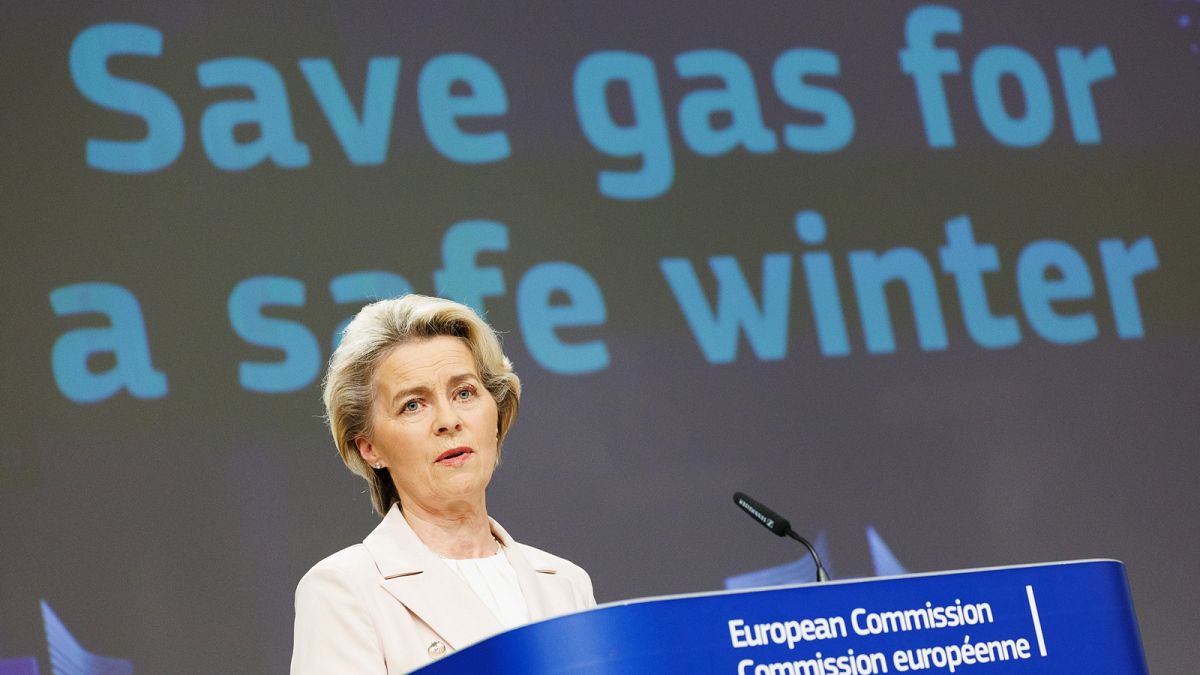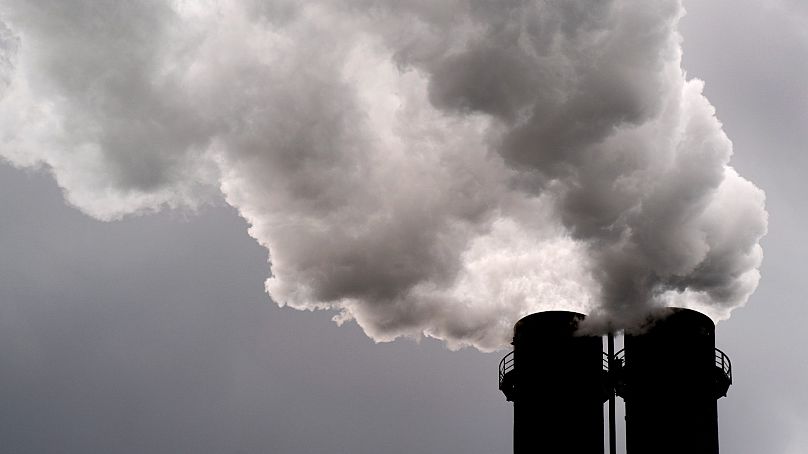The plan could introduce mandatory rationing across the bloc if Russia totally cuts off gas supplies.
The European Union is preparing for a worst-case scenario this winter, accusing Russia of potentially weaponising energy.
With 12 EU countries subject to partial or complete interruptions of Russian gas, there's concern among governments that the Kremlin could further retaliate in response to sanctions by fully interrupting the supply.
The EU this week introduced a new plan to gradually reduce gas demand to avoid shortages or blackouts this winter.
The goal is to cut consumption by 15% from August until March. Here's what you need to know about it.
Why a 15% reduction target?
The number is based on a worst-case scenario calculated by the European Commission in which Russia totally cuts off gas supplies ahead of or during an unusually cold winter.
The EU would suffer a shortage of up to 45 billion cubic metres (bcm) of gas, which represents 15% of what member states consume on average between August and March.
Gas is the EU's leading source for heating. It is also used for electricity production to varying degrees.
The Commission argues that, if member states take pre-emptive action and begin saving gas before Russia turns off the taps, the disruption will be managed and the economic shock will be contained.
In the case of a normal winter, the gap would be 30 bcm of gas – equal to a 10% reduction.
Is the reduction voluntary or compulsory?
For the time being, the reduction in gas consumption will be voluntary.
Each government commits – on paper – to meet the 15% target by the end of March through methods such as temperature limits on air conditioning and heating, switching to alternative fuels and postponing the phase-out of nuclear energy.
Businesses, factories, public buildings and private households will all be asked to contribute to the collective undertaking, which means governments will have to organise public awareness campaigns to get people on board.
It's unclear how far member states will be willing to go under a voluntary scheme, but unpredictable and soaring energy prices may act as a motivator.
In case of a severe shortage or exceptionally high demand, the 15% reduction target will become mandatory under a so-called Union alert, an unprecedented crisis system that could lead to painful sacrifices.
How will a Union alert be triggered?
The initiative to declare a Union alert can be taken by the Commission itself or a group of five countries.
They will have to argue the extreme drop in Russian gas supplies can no longer be offset by voluntary means.
After this, the EU Council will be able to trigger the Union alert through a qualified majority vote (55% of member states representing at least 65% of the EU population). No individual veto will be allowed.
If the Council does approve the drastic move, the 15% reduction target will become immediately mandatory. The clock, however, will not start from zero: the calculation will take into account the previous efforts made on a voluntary basis.
For example, if a country has managed to slash its gas consumption by 5% by the end of November, and a Union alert is triggered in early December, the country will have to cut its consumption by 10% until March to reach the overall 15% mark.
Member states will report to the Commission every two months, explaining the actions they are taking to comply with the mandatory goal.
Could this lead to gas rationing across the EU?
Yes. If methods like fuel switching and temperature limits are not enough to reach the target, some countries, like those heavily dependent on Russian gas, might have to resort to gas rationing.
In this case, the government will step in and regulate the distribution of gas. The EU has agreed to protect private households and essential services, like schools and hospitals, from any rationing measures, so the burden will likely fall on the private sector.
Countries will have to decide which factories and services they allow to keep running and which ones they shut down. Critical industries, such as food, health and defence, will be a top priority, followed by services that operate cross-border and ensure the proper functioning of the single market.
Special attention will also be paid to factories whose installations can be permanently damaged if they ever stop running, like glass, steel, ceramics, textiles and pharmaceutics, and those that use gas molecules directly in their production processes, like fertilisers and chemicals.
The dreaded scenario has gone from remote to possible in a matter of weeks.
Last month, Germany activated the second phase of its three-stage emergency plan, the prelude to rationing, as flows through Nord Stream 1 continued to decrease at a worrying pace.
Are there any exemptions?
Three countries will be entirely exempted from the Union alert system: Ireland, Malta and Cyprus. They are physically disconnected from the EU so gas savings would not benefit other states.
Estonia, Latvia and Lithuania also secured an exemption because, due to their Soviet legacy, they are still hooked to Russia's power grid and could be left in the dark at a moment's notice. The exemption will only enter into force if Russia retaliates.
Besides these two opt-out clauses, the final deal includes a list of derogations to partially reduce the 15% target and bring it down to single-digit territory.
One derogation will apply to countries that are poorly connected to other member states and demonstrate they export liquefied natural gas (LNG) to the "fullest" of their capacity.
Spain and Portugal, who have long argued about the Iberian peninsula's unique energy landscape, pushed for this change and will be among the first beneficiaries.
Another derogation will apply to countries that overshoot the EU-wide gas storage target, which was recently set at 80% by 1 November. This is seen as a "reward" for those who strive to stock as much gas as possible ahead of the winter season.
Latest storage data shows that Denmark, Poland, Sweden and Portugal are already above the 80% mark, with the Czech Republic, France, Spain, Belgium and Italy getting close.
Countries that use gas molecules in critical industries and cannot replace them overnight will also be able to request a partial reprieve. In principle, any member state could benefit from this provision, but EU officials say its impact will be limited because only a few industrial sectors, like fertilisers, use gas as feedstock.
Member states that have increased their gas consumption by 8% in the last year will also be partially spared because the 15% reduction target is based on the average consumption of the last five years.
Experts at the Bruegel think tank estimate that Bulgaria, Greece, Poland and Slovakia will fall in this category.
Won't so many exemptions render the plan useless?
The long list of exemptions and derogations cast serious doubts over the effectiveness of the Union alert system.
A senior EU official, speaking on the condition of anonymity, admitted the special provisions mean the final savings will be somewhere between 45 bcm (cold winter scenario) and 30 bcm (normal winter), but without fully reaching the higher figure.
Nevertheless, only one exemption – that for insular countries – is automatic. The other derogations have to be examined case-by-case by the Commission, who will then issue an opinion with comments.
It remains to be seen what kind of action Brussels will take if a member state applies a derogation that is not justified or if it simply refuses to follow the mandatory 15% target.
Hungary was the only country that voted against the plan, calling it "unjustifiable, unnecessary and unworkable." Budapest had previously declared a state of emergency, restricting the export of energy supplies, a decision Brussels warned runs counter to the principle of solidarity and single market rules.
The case proves how extremely sensitive energy has become for capitals, which are under enormous pressure from citizens to bring soaring bills under control. EU officials are confident that "peer pressure" among states could help enforce the savings plan and prevent infractions.

